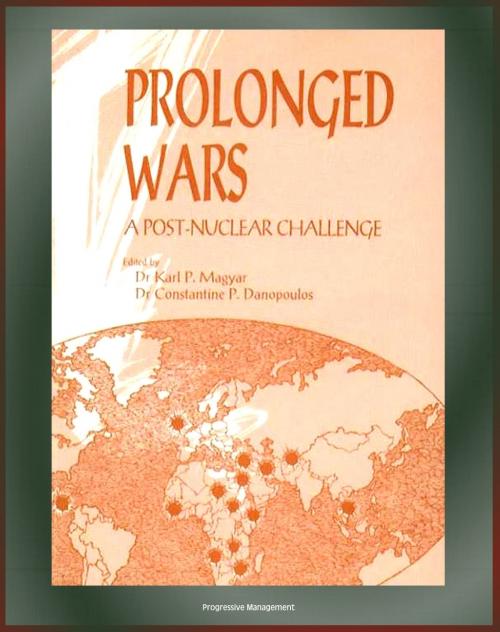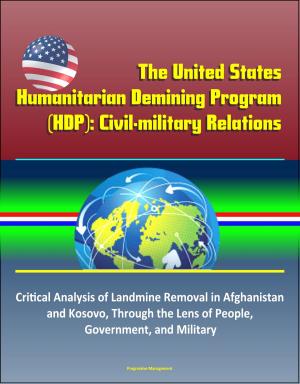Prolonged Wars: A Post-Nuclear Challenge - Iran, Iraq, Afghanistan, Northern Ireland, Vietnam, El Salvador, Sudan, Ethiopia and Eritrea, Liberia, Angola, Namibia, Nicaragua
Nonfiction, History, Military, Vietnam War, Asian| Author: | Progressive Management | ISBN: | 9781476495521 |
| Publisher: | Progressive Management | Publication: | July 5, 2012 |
| Imprint: | Smashwords Edition | Language: | English |
| Author: | Progressive Management |
| ISBN: | 9781476495521 |
| Publisher: | Progressive Management |
| Publication: | July 5, 2012 |
| Imprint: | Smashwords Edition |
| Language: | English |
The authors examine the underlying impact of the cold war on protracted conflict in Africa and Asia. These area specialists examine the factors that produced prolonged conflict and what each side in them considered the cause(s) of these struggles. They analyze the reasons for "success" and "failure" in each of these regional conflicts.
This book was conceived on the battlefields of Vietnam, where the term Vietnam became more than a geopolitical or cultural designation and came to denote a phenomenon. Vietnam is today a euphemism for getting mired in a war, for getting bogged down, for being drawn into a quagmire. Since that war, the US has not entered any military engagement without the fear of encountering another Vietnam. Nor are we alone. The Soviets met their Vietnam in Afghanistan; the South Africans experienced theirs in Angola; and the Nigerians encountered theirs in Liberia. In these cases, the problem concerned the usual expectations of a war of brief duration—the "short, sharp strike" and the realities of subsequent military involvement which came to be measured in terms of years.
Histories have been written of such long wars. Indeed, Thucydides offered the first masterful account of a prolonged war, recording the vicissitudes of battles as they changed the fortunes of societies locked in a struggle which could not be anticipated when the first spear pierced the last moment of peace. Since then, there have been short wars, but they are the exception. More often, wars have bogged down and produced results hardly anticipated by the conflicts' perpetrators. The general term for such conflicts has been protracted war.
Contents * PREFACE * Essays * Introduction: The Protraction and Prolongation of Wars * Karl P. Magyar * Iran-Iraq: Protracted Conflict, Prolonged War * M. A. Shahriar Shirkhani and Constantine P. Danopoulos * The Longevity of the Lebanese Civil War * As'ad AbuKhalil * The Arab-Israeli Wars: A Conflict of Strategic Attrition * Stewart Reiser * Prolonged Conflict in the Sudan * Ann Mosely Lesch * Fire in the Horn: Prolonged War in Ethiopia and Eritrea * Cobie Harris * Chad: The Apparent Permanence of Ethno-Regional Conflict * Frederick Belle Torimiro * Liberia's Conflict: Prolongation through Regional Intervention * Karl P. Magyar * The Rhodesian Conflict: 1966-79 * Herbert M. Howe * Civil War in a Fragile State—Mozambique * Christopher Gregory * The War Over Angola and Namibia: Factors of Prolongation * Garth Shelton and Karl P. Magyar * Cambodia: Prolonged War, Prolonged Peace? * J. Richard Walsh * El Salvador's Prolonged Civil War * Steffen W. Schmidt * Nicaragua's Prolonged Contra War * Charles L. Stansifer * The Prolongation of the United States in Vietnam * Earl H. Tilford, Jr. * The Soviet War in Afghanistan * Stephen Blank * Northern Ireland: A Prolonged Conflict * Benjamin Kline * Tentative Observations and Conclusions * Constantine P. Danopoulos with Rebecca R. Ruelas
The authors examine the underlying impact of the cold war on protracted conflict in Africa and Asia. These area specialists examine the factors that produced prolonged conflict and what each side in them considered the cause(s) of these struggles. They analyze the reasons for "success" and "failure" in each of these regional conflicts.
This book was conceived on the battlefields of Vietnam, where the term Vietnam became more than a geopolitical or cultural designation and came to denote a phenomenon. Vietnam is today a euphemism for getting mired in a war, for getting bogged down, for being drawn into a quagmire. Since that war, the US has not entered any military engagement without the fear of encountering another Vietnam. Nor are we alone. The Soviets met their Vietnam in Afghanistan; the South Africans experienced theirs in Angola; and the Nigerians encountered theirs in Liberia. In these cases, the problem concerned the usual expectations of a war of brief duration—the "short, sharp strike" and the realities of subsequent military involvement which came to be measured in terms of years.
Histories have been written of such long wars. Indeed, Thucydides offered the first masterful account of a prolonged war, recording the vicissitudes of battles as they changed the fortunes of societies locked in a struggle which could not be anticipated when the first spear pierced the last moment of peace. Since then, there have been short wars, but they are the exception. More often, wars have bogged down and produced results hardly anticipated by the conflicts' perpetrators. The general term for such conflicts has been protracted war.
Contents * PREFACE * Essays * Introduction: The Protraction and Prolongation of Wars * Karl P. Magyar * Iran-Iraq: Protracted Conflict, Prolonged War * M. A. Shahriar Shirkhani and Constantine P. Danopoulos * The Longevity of the Lebanese Civil War * As'ad AbuKhalil * The Arab-Israeli Wars: A Conflict of Strategic Attrition * Stewart Reiser * Prolonged Conflict in the Sudan * Ann Mosely Lesch * Fire in the Horn: Prolonged War in Ethiopia and Eritrea * Cobie Harris * Chad: The Apparent Permanence of Ethno-Regional Conflict * Frederick Belle Torimiro * Liberia's Conflict: Prolongation through Regional Intervention * Karl P. Magyar * The Rhodesian Conflict: 1966-79 * Herbert M. Howe * Civil War in a Fragile State—Mozambique * Christopher Gregory * The War Over Angola and Namibia: Factors of Prolongation * Garth Shelton and Karl P. Magyar * Cambodia: Prolonged War, Prolonged Peace? * J. Richard Walsh * El Salvador's Prolonged Civil War * Steffen W. Schmidt * Nicaragua's Prolonged Contra War * Charles L. Stansifer * The Prolongation of the United States in Vietnam * Earl H. Tilford, Jr. * The Soviet War in Afghanistan * Stephen Blank * Northern Ireland: A Prolonged Conflict * Benjamin Kline * Tentative Observations and Conclusions * Constantine P. Danopoulos with Rebecca R. Ruelas















